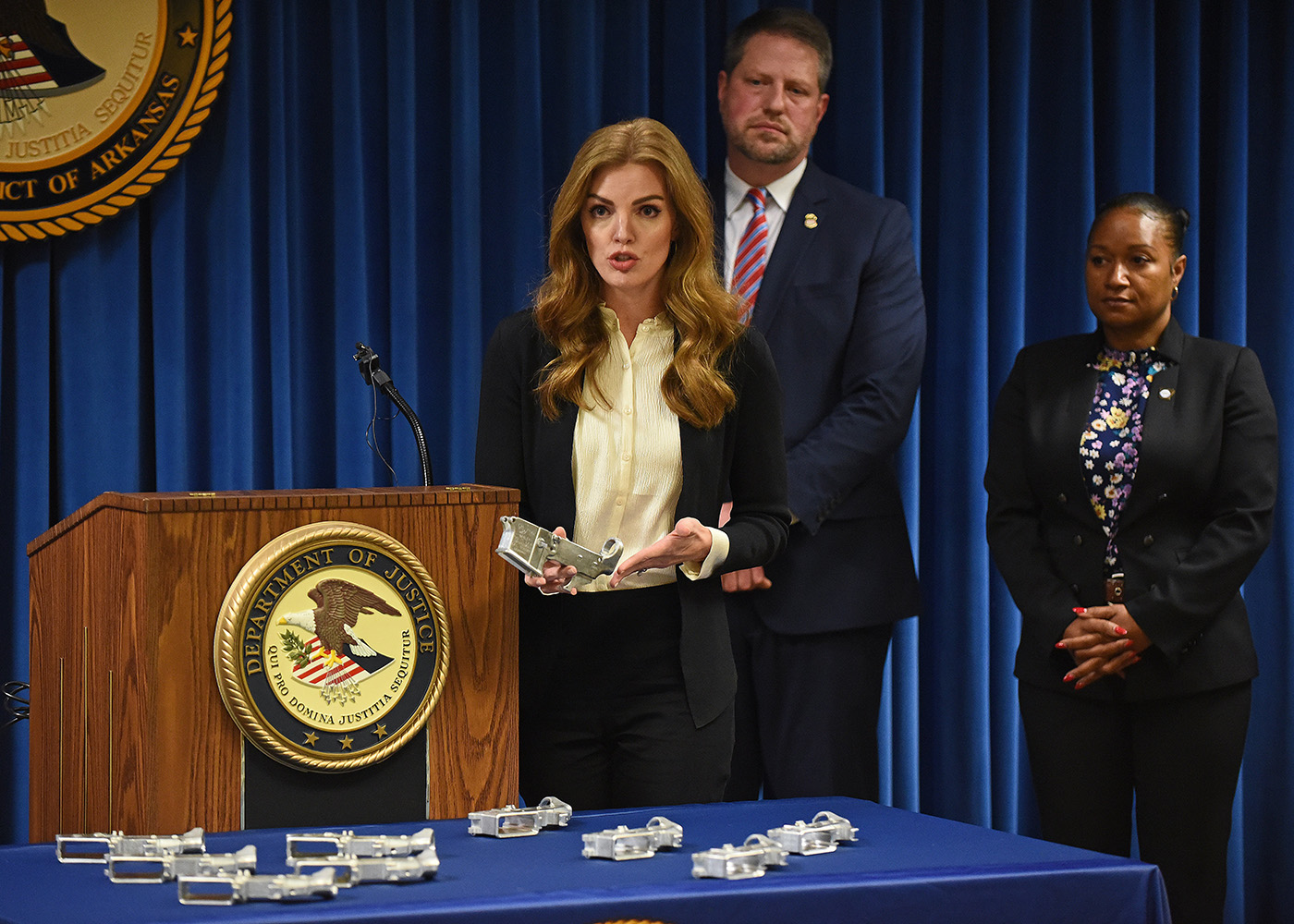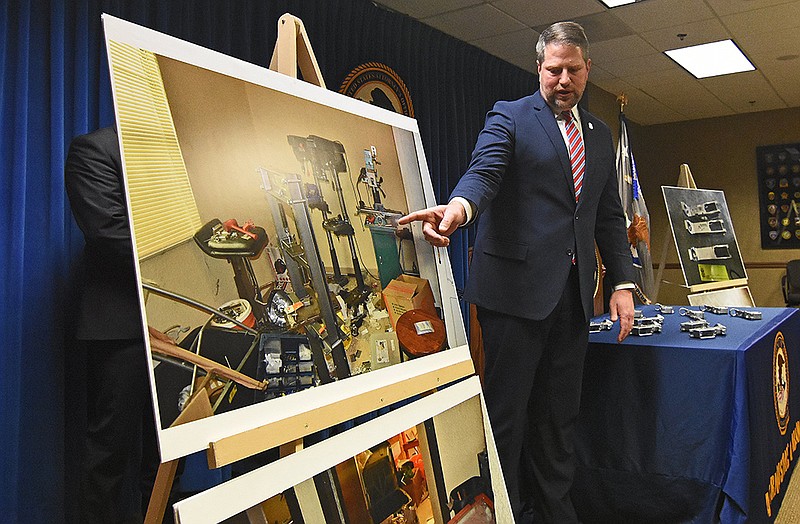An Oklahoma man was sentenced to spend the next 12 years in prison after he admitted helping Mexican cartels build and customize guns -- a case described as the first of its kind in the U.S.
Andrew Scott Pierson, 49, of Jay, Okla., was indicted by a federal grand jury in Arkansas in 2019 on multiple counts of arms trafficking, including conspiracy to traffic in counterfeit goods, conspiracy to violate the Arms Export Control Act, attempt to violate the Arms Export Control Act, attempt to violate the Foreign Narcotics Kingpin Designation Act and conspiracy to violate the Foreign Narcotics Kingpin Act.
Last November, Pierson pleaded guilty to the one count contained in a fourth superseding indictment, conspiracy to violate the Arms Export Control Act, before U.S. District Judge Brian Miller in exchange for all other charges to be dropped.
Under federal sentencing guidelines, Pierson's sentencing range was between 70 and 87 months, a fine of $20,000 to $1 million and a term of supervised release of one to three years.
Investigators said from about 2014 to 2018, Pierson ordered firearm parts and material and would manufacture and repair firearms for the Cartel Del Noreste (CDN) in Nuevo Laredo, Mexico, and the Cartel Jalisco Nuevo Generacion (CJNG) in Guadalajara, Mexico.
The money generated from the firearms manufacturing plan was sent from Mexico to Laredo, Texas, into bank accounts in Pierson's name as well as the names of several others indicted in the case and the name of fictitious businesses, according to the indictment.
Federal authorities said it was a shipment of receivers that led to Pierson's undoing after the recipient, a firearms technician in Pine Bluff, recognized the receivers as fake and notified police.
During a four-hour sentencing hearing Wednesday, Pierson, through his attorney, Annie Depper of Little Rock, tried to minimize his involvement in the operation, claiming that he had gone to Nuevo Laredo, in the Mexican state of Tamaulipas, in 2012 to open a mechanic shop. In 2013, he said, he was approached by a member of the CDN cartel, Julio Garcia, and ordered to pay "cartel taxes" every month to stay in business.
"It was extortion," Pierson explained.
Initially, he said he did small jobs for Garcia, such as fitting a custom trigger and hammer and custom gold Versace hand grips on a Super .38 pistol. That grew into other jobs, but he denied ever building machine guns for the cartel and denied that he even knew how. He characterized his activities primarily as customizing guns for cartel members.
"They're status symbols," he said.
In 2016, he said, he moved his mother to Mexico after she lost her home, a ranch in Oklahoma, but when she was injured in a fall two years later and moved back to the States, he moved into her home because it was closer to his mechanic shop and more secure. After that, he said Garcia asked to rent two rooms from Pierson in his old residence for storage.
Pierson maintained the tools and firearm parts seized by police from that residence belonged to Garcia and his successor, Ivan Salcedo, also known as Oso, who took over after Garcia was killed by the cartel in September 2018. After Garcia was killed, he said, he ordered a milling machine branded as the "Ghost Gunner 2," designed to mill lower receivers into working firearms to pacify Oso and other cartel members.
"Julio and Oso had taken an order and Julio had done something with the money that had gotten him killed," Pierson said. "Oso needed something to turn in to the cartel because they were both liable for it, so Oso came to me because I knew where the parts came from. Because I don't know how to mill out a receiver, I ordered the Ghost Gunner and gave it to Oso ... so Oso had the Ghost Gunner and Oso was doing all this work."
During a contentious cross examination, Pierson sparred with Assistant U.S. Attorney Anne Gardner over several points of disagreement as Gardner pointed out differences between his testimony on the stand and transcripts of earlier interviews. He insisted that he had only repaired one gun for Garcia.
"But you went up into the hills to the leader of CND to fix his gun," Gardner said. "They called you up specifically to do that, did they not?"
"No," he replied.
"But that's what you said in your statement," Gardner said.
"That was the primo," Pierson said. "That's not the leader, that's the cousin."
"You're sitting here wanting the judge to believe that you did nothing but order some things on the internet?" Gardner said. "Is that what you want him to think?"
"Yes," Pierson said.
"You're lying," Gardner said, flatly.
Finally, Gardner said to Pierson, "so you aren't in charge of any of this, you're just a go boy, aren't you?"
"I'm just a gopher, yeah," he replied.
Before sentencing, Pierson apologized for his actions, saying he had gotten caught up in a situation beyond his control.
"I wish I'd made a different choice," he told the judge. "I saw the examples the cartel made and it scared the s*** out of me ... I lived in Mexico where it's 'plata o plomo,' you take the silver or you get the lead."
Miller said he could not justify Depper's request for a downward departure of Pierson's sentence below the 70 month minimum but said the evidence presented did not justify a maximum statutory sentence of 20 years that Gardner had asked for.
Miller said an upward variance would be appropriate to deter others from such conduct, but he said the statutory maximum of 20 years would be too much and would likely be overturned by the 8th Circuit Court of Appeals.
"I think 12 years is an appropriate sentence," Miller said, ordering Pierson to also serve 3 years supervised release after he leaves prison.
At a news conference following the sentencing, U.S. Attorney Jonathan Ross praised the law enforcement agencies that participated in the investigation.
"This case was the first Mexican cartel firearms parts case to be indicted in the United States," Ross said. "This case started as an internet, financial-based investigation that led to the conspiracy to track hundreds of firearm parts across the border."
Ross said the operation involved the cooperation of multiple agencies in the U.S., including the FBI, Department of Justice, Bureau of Alcohol, Tobacco, Firearms and Explosives, Homeland Security, the U.S. Postal Inspection Service, the Pine Bluff Police Department, the National Guard and authorities in Mexico.
"Directly after the indictment of Pierson and his network," Ross said, "there was a substantial reduction in the availability of firearms to the [cartels]."
Ross said the prosecution of Pierson in Arkansas was the first of its kind in the U.S. in combating the flow of guns south from the U.S. into Mexico, but he promised more.
 Allison Bragg (left), a spokeswoman for the U.S. attorney’s office, talks about 80% receivers as U.S. Attorney Jonathan Ross and Deputy Chief Denise Richardson of the Pine Bluff Police Department look on during a news conference Wednesday at the U.S. attorney’s office in Little Rock. (Arkansas Democrat-Gazette/Staci Vandagriff)
Allison Bragg (left), a spokeswoman for the U.S. attorney’s office, talks about 80% receivers as U.S. Attorney Jonathan Ross and Deputy Chief Denise Richardson of the Pine Bluff Police Department look on during a news conference Wednesday at the U.S. attorney’s office in Little Rock. (Arkansas Democrat-Gazette/Staci Vandagriff)